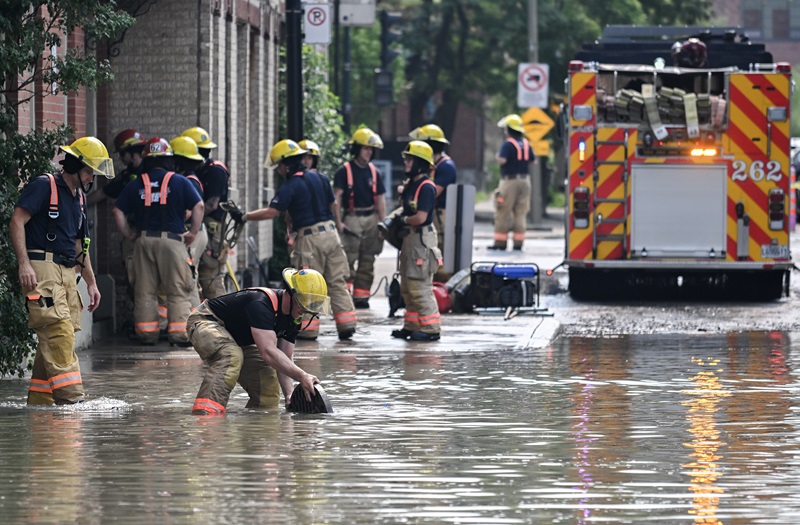Who’s on the hook for flood damage after water main breaks?

City water mains are giving out right as Canadians are facing multiple flooding catastrophes, prompting insurers to call for a revamp of basic infrastructure to withstand modern-day storms.
For Canadian property and casualty insurers, bolstering ailing water infrastructure is part of a triad of top priorities for all Canadian governments.
“Governments have to make the hard choices to stop building and rebuilding on flood plains, invest in disaster mitigation including upgrades to stormwater infrastructure, and roll out programs to fire- and flood-proof homes,” Insurance Bureau of Canada stated this past week.
The City of Calgary discovered a large water main break in the Bowness and Montgomery area on June 5. “The break was on the Bearspaw South Feeder Main, a critical transmission line that carries most of the water from the Bearspaw Water Treatment Plant into Calgary’s water distribution network.”
The pipe carries 60% of the city’s water to 1.6 million residents, who have been asked to cut their water use by one-quarter. Global News reports a class action lawsuit has been filed against the city, with business owners claiming they have lost business because of the flood caused by the ruptured water main.
Meanwhile, in Montreal, a water main break in August spouted a gigantic geyser of water two storeys high, flooding the Jacques Cartier Bridge. One hundred people in the area were evacuated from their homes; out of these people, 60 asked for support from the Red Cross and 50 experienced basement flooding, as reported by CTV News in Montreal, citing Montreal Mayor Valérie Plante.
Most of these residents would be covered under their home insurance policies for flood losses due to water main breaks, P&C insurance industry sources tell Canadian Underwriter.
“Damage from a water main break is generally covered under a homeowner’s policy, however the repair to the water main is not,” IBC told CU in an email. “You don’t need an overland flood endorsement to be covered for a water main break and resulting damage.”
Water main breaks are covered as part of the “plumbing water damage” portion of a typical policy, Glenn McGillivray of the Institute for Catastrophic Loss Reduction (ICLR) tells CU. “Insurers will then decide whether to subrogate against the municipality.”
But that decision is complicated by a number of factors, says Mitch Insurance service manager Alex Gemmiti.
“There has to be negligence on some part, right?” he says. “So, it’s not just simply that [the municipalities] own the water main, but that they fail to maintain it in some way, or they construct it improperly, or something like that. And that’s often difficult to prove in some situations.
“Even…if the city can show that, ‘Yes, we routinely inspect, and we are replacing the oldest [pipes], and we have a plan in place — it’s just not keeping up with how quickly they’re rupturing — it could be said they’re still doing their part or doing what’s reasonable.”
Gemmiti says that during his claims career, he has seen municipalities introduce bylaws preventing residents from subrogating against the municipality, not just for water main ruptures, but for other kinds of losses as well. “So, more often than not, it’s the insurance company left holding the bill,” he says.
It could be a very large bill, given the state of today’s infrastructure, as reported by the Canadian Federation of Municipalities. That’s why the FCM is calling on all governments to meet and discuss and develop “a municipal growth framework — a new, more equitable way to fund local governments.”
Among its recommendations, the FCM recommends increasing direct annual transfers to municipalities by $2.6 billion (bringing the total to $5 billion), indexing federal transfers to gross domestic product (GDP), and broadening the eligible expenses under federal transfers to include operating costs and infrastructure, as reported by CBC News.
“Plus, they’re asking that provincial and territorial governments match the annual funds from the federal government, providing an equivalent of $5 billion per year in new funding to municipalities,” CBC News reports.
Photo credit: Firefighters remove a manhole cover following a water main break on a street in Montreal, Friday, August 16, 2024, causing flooding in several streets of the area. Cleanup is underway after a major water main break near Montreal’s Jacques Cartier Bridge flooded dozens of buildings on Friday and left nearly 150,000 people under a boil-water advisory. THE CANADIAN PRESS/Graham Hughes







